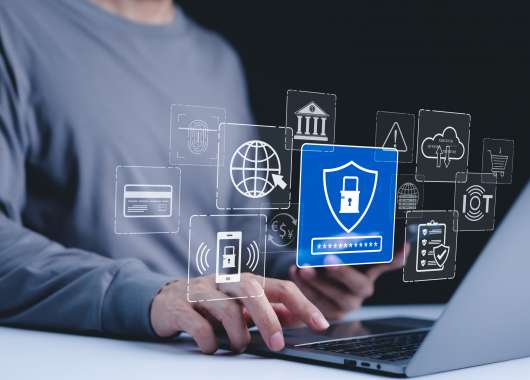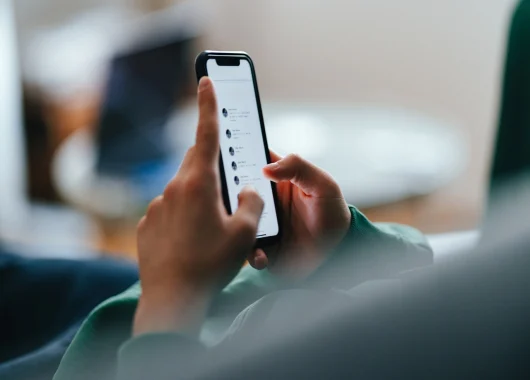When an unfamiliar number starting with 888 pops up on your phone, your first instinct might be to ignore it. But what is it: a scam, a telemarketer or something important? Americans receive an average of 3.3 billion spam and unwanted calls every month, making it hard to know which calls to trust.
The 888 area code is actually a toll-free number used by businesses and organizations across the U.S. and Canada. Even though 888 numbers are legitimate, they’re also frequently used by scammers trying to appear trustworthy. Learn more about the 888 area code, how to tell if a call from one is safe and what to do if you suspect a scam.
What Are 888 Numbers?
888 numbers are toll-free telephone numbers used by businesses, nonprofits and other organizations to allow people to call them without being charged. They’re part of a group of toll-free codes in North America that also includes:
- 800
- 833
- 844
- 855
- 866
- 877
These numbers are often used for customer support, sales, technical assistance and helplines.
The 888 prefix was introduced in 1996 when the supply of 800 numbers started running low due to high demand. While 888 numbers function the same as other toll-free numbers, they don’t indicate a specific location. They provide easy and free access to services, irrespective of the caller’s location.
What Are 888 Numbers Used For?
Since 888 callers aren’t charged, it makes it easier for people to call without hesitation. In some cases, 888 numbers can be used for scam calls or even WhatsApp scams.
Legitimate uses for 888 numbers include:
- Customer service and support lines
- Sales and order hotlines
- Corporate office or headquarters contact numbers
- National hotlines
- Nonprofit helplines
- Appointment scheduling or confirmation services
- Billing departments or account management centers
For businesses, having an 888 number adds a level of professionalism and accessibility. It allows companies to expand their reach nationwide without tying their brand to a specific geographic area, which can be especially valuable for remote or online-first operations.
Are 888 Numbers Safe?
In general, 888 numbers are safe and aren’t scam phone numbers. But because toll-free numbers are so common and easy to obtain, they’re also frequently misused by scammers. That’s why it’s important to stay cautious, even if a call looks official.
Here’s why toll-free numbers like 888 are sometimes associated with scams:
- The lure of “toll-free”: Scammers take advantage of the fact that toll-free numbers are often viewed as legitimate. Since people recognize them as business lines, they may be more likely to answer or trust the call.
- Ease of acquisition: It’s relatively simple for anyone to get a toll-free number through online services, including scammers who want to appear credible.
- Caller ID spoofing: Scammers can use technology to manipulate the caller ID, making it seem like they’re calling from an 888 number, even if they’re not. This makes it harder to trace the call or recognize it as suspicious.
Lack of geographic origin: Unlike local numbers that hint at where a caller is located, toll-free numbers like 888 offer no geographic clues. This adds to their anonymity and can make scam calls harder to identify.
Types of Scams Associated With 888 Numbers
Calls from 1-888 scammer numbers trick people into giving up sensitive information, making payments or clicking on malicious links. Knowing the most common scam tactics can help you recognize and avoid them. Watch out for the following types of toll-free scams:
Impersonation Scams
These scams involve someone pretending to be from a trusted organization to gain your trust and pressure you into action. The goal is often to collect personal or financial information.
Common examples:
- Tech support scams: Claiming to be from Microsoft, Apple or another tech company, warning you of a fake virus or account breach
- Government agency scams: Pretending to be from the IRS, Social Security Administration or Medicare, demanding urgent action or payment
Legitimate agencies won’t call to demand payment or sensitive information over the phone. Be wary of threats, urgency or requests for payment in gift cards or wire transfers.
Prize/Lottery Scams
These scams claim you’ve won a prize, lottery or sweepstakes, but you must pay a fee or provide personal details to claim it. They are often part of social media scams.
Remember, you can’t win a contest you didn’t enter. Be cautious of any “win” that asks for upfront payment, especially if it comes out of the blue.
Debt Collection Scams
In these scams, callers pose as debt collectors and use intimidation tactics to demand money for debts you don’t owe. Sometimes, they might use spam text messages, too.
Scammers may threaten lawsuits, arrest or wage garnishment. Always ask for written proof of the debt before taking any action.
Phishing/Smishing Attempts
These scams involve calls or texts from 888 numbers attempting to collect sensitive info like bank details, login credentials or Social Security numbers through phishing attempts.
Legitimate companies will never ask for personal information over text or unsolicited phone calls. Avoid clicking links or sharing details unless you’re 100% sure who you’re speaking with.
Robocalls and Spam
Some 888 numbers are used for high volumes of vishing or automated robocalls, which may include scams, fake offers or subscription traps.
If you answer and hear a pre-recorded message, hang up immediately. Consider using your phone’s spam-blocking features or registering with the National Do Not Call Registry.
How to Determine If an 888 Call Is Legitimate
If something feels off, there are a few easy ways to verify whether the call is coming from a trusted source or a potential scammer.
Never Trust Caller ID Alone
Even if your phone shows a familiar business name or an 888 number, that doesn’t guarantee it’s real. Scammers can easily spoof caller ID to make a fake call appear legitimate. In fact, many scam calls are designed to mimic trusted institutions to lower your guard.
Verify the Caller Independently
If you’re unsure, hang up and contact the company directly using a phone number from their official website, a billing statement or a recent email — never the number provided during the call. Don’t use the redial function, and don’t call back the same number that just rang you.
Be Wary of Pressure Tactics
Scammers often use urgency to push you into quick decisions, like threatening legal action or insisting you act immediately. Legitimate businesses and agencies rarely demand instant payment or threaten arrest over the phone.
Protect Your Personal Information
Never give out sensitive information, such as your Social Security number, bank account details or passwords, unless you initiated the call and are sure you’re speaking to a verified source. Scammers often create a sense of urgency to pressure you into revealing personal data — don’t fall for it.
Recognize Red Flags
Watch for signs that something isn’t right. Common red flags include:
- Demands for payment via gift cards, wire transfers or cryptocurrency
- Unprofessional behavior, such as poor grammar, inconsistent accents or vague responses
- Requests for remote access to your computer or device
A refusal to provide written confirmation or identifying details
Use Online Resources
Before engaging further, search the phone number online. Typing the number along with keywords like “scam,” “review” or the name of the company can quickly reveal if others have reported suspicious activity related to that 888 number.
How to Report an 888 Scam
If you believe you’ve received a scam call from a 1-888 number, report it to protect others and assist authorities in tracking down fraudsters. Even if you didn’t fall for the scam, your report can help stop similar schemes in the future.
You can report 888 scams to:
- Federal Trade Commission (FTC): For general scams, imposter scams and identity theft
- Federal Communications Commission (FCC): For unwanted calls, robocalls, telemarketing and spoofing
- Your phone carrier: For reporting spam or blocking numbers through apps or support channels
- Internet Crime Complaint Center (IC3): For financial loss or suspected identity theft
- State Attorney General’s Office: For state-specific consumer protection
When filing a report, be sure to include:
- The date and time of the call
- The number that appeared on your caller ID, even if you suspect it was spoofed
- A detailed description of the scam, like what the caller said, what they asked for and any threats they made
Any financial loss or personal information you may have shared
Safety Tips and Best Practices for 888 Numbers
Following a few simple habits can go a long way in protecting your privacy and avoiding potential scams. Here’s what you can do to avoid 888 scams:
- Let unknown calls go to voicemail: If you don’t recognize the number, it’s best not to answer. Legitimate callers will typically leave a message you can verify later.
- Block suspicious numbers: Most smartphones have built-in blocking features. You can also use third-party apps to prevent repeat calls from known scam numbers.
- Report scam calls: If you receive a suspicious 888 call, report it to the FCC, the FTC and your phone carrier to help prevent future scams.
- Consider call blocking or spam filtering apps: Tools like Nomorobo, Truecaller or Hiya can help identify or block known spam and scam callers.
Stay informed: Scam tactics are constantly evolving. Staying updated on current cyber trends can help you recognize red flags before it’s too late.
Stay Alert When Dealing With 888 Numbers
888 numbers can be completely legitimate — used by businesses, support centers and government agencies — but they’re also a common tool for hackers looking to exploit trust. That’s why it’s important to stay cautious, independently verify any caller’s identity and approach unexpected calls with healthy skepticism.
Use reliable antivirus software to add an extra layer of protection, detect suspicious activity and block potential threats before they reach you. Up-to-date antivirus protection helps you guard sensitive data and stay ahead of evolving threats like malware and phishing.
888 Area Code FAQ
Still have questions about 888 numbers? Here are some quick answers to the most common concerns people have about these toll-free calls.
Should I Answer 888 Numbers?
If you don’t recognize the number, it’s best to let the call go to voicemail. Legitimate callers will usually leave a message you can review and verify.
Can Scammers Use a Real Company’s 888 Number?
Yes, scammers can spoof legitimate 888 numbers, making it appear as if they’re calling from a trusted business, even when they’re not. Always verify the caller independently if something seems off.
Can I Block All 888 Numbers?
While most phones don’t allow blocking an entire area code, you can block individual numbers and use spam-filtering apps to reduce unwanted 888 calls.






